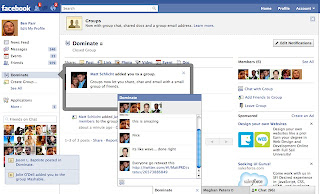Facebook has just revealed a new version of Groups at its live press conference in Palo Alto, California. Facebook Groups are a shared space where members can participate in communal activities like group chat, e-mail lists, document sharing and group photo-tagging.
The new Groups product was built from the ground up; Facebook Founder and CEO Mark Zuckerberg says Groups is an entirely new product that only shares the name in common with the old Groups functionality. The old Groups will continue to remain in place, but moving forward members will only be able to create new Groups.
Groups are closed by default (but can be secret or open) and are designed to be spaces where small groups of friends share information, with each group controlled by the entirety of its members — an important new direction for Facebook. The group chat feature is just as it sounds; members can participate in back-and-forth IM conversations with everyone in the group at the same time.
Once you start participating in Groups, the most-viewed ones will automatically live in the left-hand navigation of the page for easier access.
Facebook has also released a mobile interface and an Open Graph API for Groups, which means that soon Facebook Groups will be accessible in all imaginable capacities.
With everyone in control, Groups will function much differently than before. Facebook asserts that social norms will govern activity. Ultimately, the company believes the new Groups will fundamentally change the way you use Facebook and give you more control over the distribution of your messages.
From our initial tests, we can assert that Groups is, as Zuckerberg promises, something “so simple that everyone on the site will want to interact with it.” And, by design, everyone will use it.
 As Facebook clearly stated during the press event, its goals are to map all real-world groups, to ensure that everyone participates and to build something useful in lots of contexts. What this really means is that Facebook wants to fully understand member relationships (an extension of its Open Graph undertaking), and that the company will use your behavior in Groups to better understand these relationships.
As Facebook clearly stated during the press event, its goals are to map all real-world groups, to ensure that everyone participates and to build something useful in lots of contexts. What this really means is that Facebook wants to fully understand member relationships (an extension of its Open Graph undertaking), and that the company will use your behavior in Groups to better understand these relationships.





0 comments:
Post a Comment